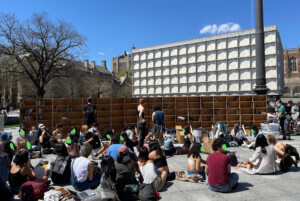It’s the start of the 2023–24 academic year, so that means a new crop of leaders are beginning the semester. To check in, AN spoke with a set of leading educators about their roles. Each answered a septet of questions; the fourth in this series is Quilian Riano, Dean of Pratt Institute’s School of Architecture.
What are your goals and ambitions for your new role?
We are just coming out of a month in which multiple heat records were broken. In fact, there are now cities that are becoming uninhabitable without air-conditioning, and the effects of this global climate crisis are being felt by the most vulnerable communities. In my new role, I am looking forward to supporting ongoing research by faculty and students, to look at our past to see practices we can bring back to our fields, and to bring in new and diverse voices to help with these important tasks.
Who is someone who has inspired your work and leadership? Why are they inspirational?
A person that stands out is Michael Sorkin. After his untimely passing in 2020 I reflected on who he was as a person and an educator, and I often would return to the generosity he always displayed towards younger designers and academics. Even as he was often a clear and critical voice of needed change in our field, he realized that this could only be accomplished by developing a design community of strong critics, thinkers, doers.
What are the most urgent topics and challenges for architectural education today?
Architectural education is being challenged to show its value in a larger moment of uncertainty and change. The moment is pushing education and practice to become even more collaborative as design professionals continue to learn to work with others as well as diverse communities.
How has the COVID-19 pandemic changed your thinking about being a leader in higher education, if it has?
Being in different administrative and leadership positions during the COVID-19 pandemic has shown me that empathy is an increasingly important tool. We are all responding to this moment by refiguring our priorities, and a leadership that responds empathetically to address the changing needs of multiple constituencies can help.
How should the topic of sustainability be incorporated into architectural education?
A more systematic approach to architecture education is needed to address the complex issue of sustainability. This includes a more systematic understanding of materiality (where do they come from? what is the labor required?) as well as a more collaborative approach to work: Together with landscape architects, natural and computer scientists, collaborative work can help us better understand the effect our design may have on the environment. As an example of an effort that we at Pratt have worked on, last year we held the Architectural Humanities Research Association (AHRA) annual conference AHRA 2022 Convening: Building Ground for Climate Collectivism, which had academics from around the world come together to discuss these issues collectively.
How should the goals of diversity and inclusivity be advanced under your leadership?
Diversity and inclusion are incredibly important for the fields that design, plan, and manage the built environment. I am looking to step up recruitment efforts for faculty, students, and staff, with a special interest in creating relationships to communities that are underrepresented in our school. I am also interested in bringing in more events like the BLACK LIVE(S) & BLACK SPACE(S): Care, Community: Housing that brought together our community with the larger community around our Higgins Hall space. These kinds of events reinforce ongoing efforts to expand our curriculum—from seminars to studios—to diversify contexts, questions, references, and outcomes.
What are you optimistic about as you create the future of architecture and architectural education?
I am very excited to see the energy of students and faculty. Many of the challenges we are facing, as per your previous questions, require this energy and acceptance. Leadership becomes easier when there is a grassroots desire for it, which I see right now to tackle rigorously with labor, environmental, and social justice issues.











